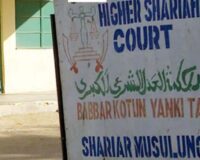The Central Bank of Nigeria (CBN) has opposed a suit before the federal high court in Lagos seeking to remove Ajami (Arabic) inscriptions on the naira notes.
CBN told the court that it will cost a lot of money to discard existing notes and print new ones without Ajami.
It also said Ajami is not a symbol or mark of Islam, but an inscription to help non-English speakers who are Ajami literate.
The apex bank made the submission in a counter-affidavit to a suit filed by Malcolm Omirhobo, a Lagos-based lawyer, before Mohammed Liman, presiding judge over the case.
In January 2020, Omirhobo had filed a suit against the federal government, CBN, and attorney general of the federation over Arabic inscription on naira notes.
Omirhobo argued that Nigeria is a secular nation and urged the court to declare it illegal, unlawful, and unconstitutional for Arabic language to be inscribed on naira notes rather than English language or Hausa, Yoruba and Igbo.
However, in its counter-affidavit deposed by Abiola Lawal, CBN said: “Ajami inscriptions on some of the country’s currencies do not connote any religious statements or Arabian alignment”.
“The inscriptions on the country’s currencies do not and at no time have they threatened the secular statehood of the nation or have they violated the constitution of Nigeria, as every design and inscription was finalised with the approval of the relevant government bodies.
“The naira notes retained the inscriptions with Ajami since 1973 when the name of the Nigerian currency was changed to naira from pounds.
“Ajami was inscribed on the country’s currency by the colonialists to aid those without Western education in certain parts of the country, who, back then, constituted a larger part of the populace.
“Ajami is not a symbol or mark of Islam but an inscription to aid the populace uneducated in Western education in ease of trade.”
CBN further said removing Arabic inscriptions from naira notes “would cost the tax-paying Nigerians and federal government colossal sum of money to discard the existing naira notes and print new ones in satisfaction of the plaintiff”.
Similarly, the Nigerian Army opposed Omirhobo’s suit seeking to remove Arabic inscriptions on the army’s logo, urging the court to throw it out.







